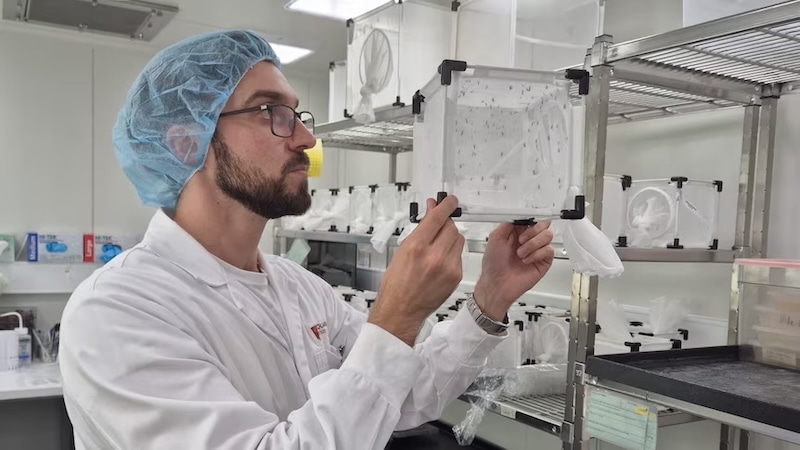This post was originally published on Eco Watch
In Australia, researchers are considering how genetic engineering could allow mosquitoes to produce venom proteins, like those produced by spiders and sea anemones, in their sperm to transfer the poison to female mosquitoes when mating.
In a study led by Macquarie University, researchers first used genetically modified fruit flies to test what has been dubbed the “toxic male technique,” which makes it possible for the insects to produce venom in their sperm. After mating, the poison transfers to the female, ultimately reducing the female fruit flies’ lifespans by 60%, researchers found. The females are targeted because they are the mosquitoes that bite humans.
As the Australian Broadcasting Corporation reported, the female fruit flies lived for only about six or seven days after mating with the poisonous males.
“Ideally it’s quite rapid,” Sam Beach, lead author of the study, told the Australian Broadcasting Corporation. “We want that to be much closer to 100 percent, like a much faster acting reaction.”
Additionally, the researchers found that the technique could reduce blood feeding by 40% to 60%, The Guardian reported.
Although the study focused on how this genetic engineering impacts fruit flies, the researchers noted in the paper that this technique could be replicated in mosquitoes to control populations of disease-causing mosquito species, particularly the Aedes aegypti, or yellow fever mosquito. The team published the findings in the journal Nature Communications.
Researchers at Macquarie University are looking to use genetic modification to minimize mosquito-borne illness. Sam Beach / Macquarie University
As The Guardian reported, the toxic male technique could reduce disease outbreaks linked to mosquitoes without using insecticides. Mosquito-borne diseases infect millions of people each year, with dengue alone linked to 390 million human infections annually, the study authors wrote.
Not only do these diseases pose health risks to humans, they can also destroy food crops and threaten native species. Further, using insecticides to target mosquitoes and other pests can lead to pesticide resistance in these pests while threatening the environment with pollution.
“Mosquitoes get resistant to insecticides very rapidly, and they can spread resistance,” Tom Schmidt, an evolutionary biologist at University of Melbourne who was not involved in the study, told The Guardian. “They can evolve it, and they can also spread it by getting on boats and planes and spreading it all over the world.”
As an alternative, the researchers said using the toxic male technique could target invasive, disease-spreading mosquito species with a lower environmental impact than pesticides.
“There are about 3,500 species of mosquito, but there are only about five to 10 or so that spread disease in humans,” Beach explained, as reported by the Australian Broadcasting Corporation. “All [those species] are invasive outside of Sub-Saharan Africa. We’re just trying to push them back out of areas that human have introduced them.”
As for concerns about animals eating the venomous mosquitoes also being harmed, the researchers noted that the venom proteins are harmful when injected directly, such as when mating, but are up to 100 times less toxic if one animal consumes a genetically modified mosquito.
The findings come at a critical time, as previous studies have warned that with warming temperatures and climate change, mosquitoes populations could expand and infect a billion more people by 2100.
This is not the first research into genetically modifying mosquitoes to reduce infection spread. In 2021, Florida officials and biotechnology company Oxitec released millions of genetically modified mosquitoes in Monroe County, which raised concerns from environmentalists over how this could impact the environment. The project involved modifying the mosquitoes to pass along a gene to offspring that would kill off the offspring in the larval stage.
As Smithsonian Magazine reported in 2022, the test was considered a success. Out of 22,000 eggs collected from the experience, only the male eggs hatched. However, the gene was not considered a long-term solution, as it was found to last for only a few months, or a few generations of mosquitoes.
For now, the team is continuing research into how the venom-producing mosquitoes would impact their predators and the environment in the short- and long-term. The researchers also hope to further shorten the lifespan after poisoning, ultimately aiming for the infectious female mosquito to die immediately upon mating.
“This is, you know, the first step in a very, very long process, Beach told the Australian Broadcasting Corporation. “We’re not looking at, you know, releasing these mosquitoes in Australia anytime soon.”
The post Australia Mosquito Population Researchers Developing Genetically Modified ‘Toxic Males’ to Kill Females by Mating With Them appeared first on EcoWatch.





0 Comments